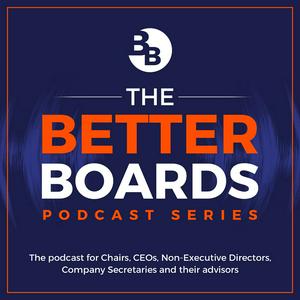Send us a textHow the Smartest Directors Are Using AI In this episode, we speak with Jamie Green, Co-Founder and CEO of Tutaki, the Director Workbench designed to make board directors radically more effective. Drawing on his experience at McKinsey and extensive conversations with Chairs, directors, and governance leaders, Jamie built Tutaki to help transform how board members prepare, engage, and act. With a strong foundation in strategy, governance, and AI product design, Jamie is at the forefront of a new era of “augmented directorship.” As complexity grows and time shrinks, AI is proving to be a performance accelerator, not just a support tool. In this episode of the Better Boards podcast, we speak with Jamie Green, Co-Founder and CEO of Tutaki, the Director Workbench designed to make board directors radically more effective. Drawing on his experience at McKinsey and hundreds of conversations with Chairs, directors, and governance leaders, Jamie built Tutaki to transform how board members prepare, engage, and act. With a background in strategy, governance, and AI product design, he’s leading a new era of “augmented directorship.” In this conversation, Jamie outlines how the best boards are using AI not just to cope—but to lead. Why effectiveness matters The most valuable strategic decisions happen in the boardroom. AI can dramatically enhance this by helping directors focus on what matters, enabling more trust and transparency with management. “Directors are the amplifiers, and it’s really key that their whole process works effectively to actually get the best out of it.” What’s holding boards back The main blockers? Lack of clarity on use, data privacy fears, and over-reliance. Jamie argues that these risks can be mitigated—and that the real risk is not using AI at all. “If you blanket rule, ‘you can’t use AI,’ and your competitors do, they’ll make faster, more accurate decisions—and leave you behind.” Where AI is heading Jamie outlines four phases of AI maturity in the boardroom: analysis, automation, AI-assisted directors, and eventually AI boards. While AI boards are still a few years off, the steps to get there are already unfolding. “Imagine if you had Warren Buffett sitting there analysing the financials. That’s the power of AI.” Start today Directors are already using AI to synthesise documents, explore competitor strategy, and broaden their thinking. The key is starting with clarity—ask AI to help you ask better questions. Three takeaways: “Not using AI is the riskiest option… The best directors are going to be AI-literate.” Not using AI is the greatest risk. The best boards are already using it. Seek out vertical tools that solve real problems. Discover how you can take the first confident steps toward AI-powered boardroom effectiveness—starting today. Remember to subscribe and never miss an episode of the Better Boards Podcast Series. It’s available on Apple, Spotify, or Google. To find out how you can participate in the Better Boards Podcast Series or for more information on Better Boards’ solutions, please email us at
[email protected].
